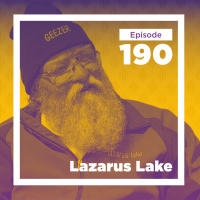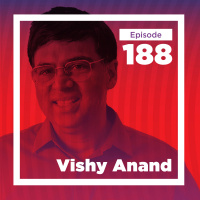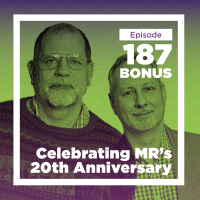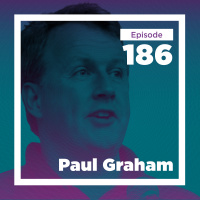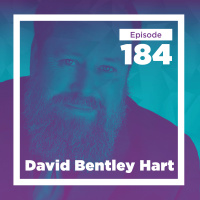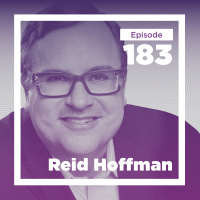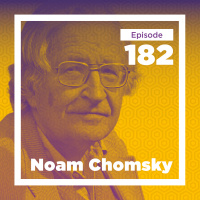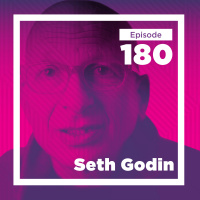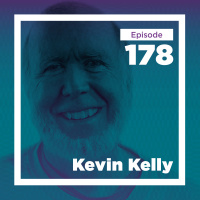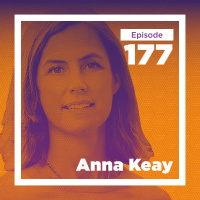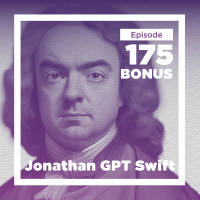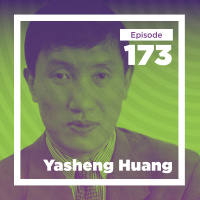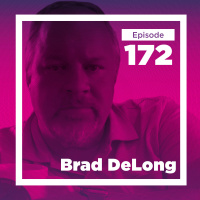Synopsis
Tyler Cowen engages todays deepest thinkers in wide-ranging explorations of their work, the world, and everything in between. New conversations every other Wednesday. Subscribe wherever you get your podcasts.
Episodes
-
Lazarus Lake on Endurance, Uncertainty, and Reaching One’s Potential
20/09/2023 Duration: 51minLazarus Lake is a renowned ultramarathon runner and designer. His most famous creation (along with his friend Raw Dog) is the Barkley Marathons, an absurdly difficult 100-mile race through the Tennessee wilderness that only 17 people have ever finished in its nearly 30-year existence. Tyler and Laz discuss what running 100 miles tells you about yourself that running 26 miles does not, why so many STEM professionals do ultramarathons, which skill holds people back the most, why his entrance fee is no more or less than $1.60, the importance of the Barkley’s opaque application process, how much each race costs to mount, whether he sees a decline in stoicism and inner strength in America, what accounting taught him about running, which books influenced him the most, who's going to win the NBA title next year, how he’s coping with increasing fame, the competition he’s most focused on now, and more. Read a full transcript enhanced with helpful links, or watch the full video. Recorded June 29th, 2023. Other ways to
-
Jerusalem Demsas on The Dispossessed, Gulliver's Travels, and Of Boys and Men
06/09/2023 Duration: 01h03minIn this special episode, Tyler sat down with Jerusalem Demsas, staff writer at The Atlantic, to discuss three books: The Dispossessed by Ursula K. Le Guin, Gulliver's Travels by Jonathan Swift, and Of Boys and Men by Richard V. Reeves. Spanning centuries and genres and yet provoking similar questions, these books prompted Tyler and Jerusalem to wrestle with enduring questions about human nature, gender dynamics, the purpose of travel, and moral progress, including debating whether Le Guin prefers the anarchist utopia she depicts, dissecting Swift's stance on science and slavery, questioning if travel makes us happier or helps us understand ourselves, comparing Gulliver and Shevek's alienation and restlessness, considering Swift’s views on the difficulty of moral progress, reflecting on how feminism links to moral progress and gender equality, contemplating whether imaginative fiction or policy analysis is more likely to spur social change, and more. Read a full transcript enhanced with helpful links, or watch
-
Vishy Anand on Staying in the Game
30/08/2023 Duration: 54minA five-time World Chess Champion, Vishy became India's first grandmaster at age 18, spurring a chess revolution in the country. Now 53, he is still a world top ten player and has been India's number one ranked player for 37 years. As newer talents emerge and old ones retire, Anand's continued excellence showcases an endurance seldom seen. Tyler and Vishy sat down in Chennai to discuss his breakthrough 1991 tournament win in Reggio Emilia, his technique for defeating Kasparov in rapid play, how he approached playing the volatile but brilliant Vassily Ivanchuk at his peak, a detailed breakdown of his brilliant 2013 game against Levon Aronian, dealing with distraction during a match, how he got out of a multi-year slump, Monty Python vs. Fawlty Towers, the most underrated Queen song, how far to take chess opening preparation, which style of chess will dominate in the next ten years, how AlphaZero changes what we know about the game, the key to staying a top ten player at age 53, why he thinks he's a worse loser
-
Celebrating Marginal Revolution's 20th Anniversary
23/08/2023 Duration: 58minWhen Alex Tabarrok and Tyler Cowen launched Marginal Revolution in August of 2003, they saw attracting a few thousand academic-minded readers as a runaway success. To their astonishment, the blog soon eclipsed that goal, and within a decade had become one of the most widely read economics blogs in the world. Just as remarkably, the blog maintained its relevance in its second decade, bringing in a new generation of readers without a dip in the pace or quality of the posts. As Alex and Tyler jest, only the onset of senility could possibly rein them in. To mark MR's entrance into its third decade, long-time readers Ben Casnocha, Vitalik Buterin, and Jeff Holmes joined Alex and Tyler to talk about MR's legacy, including the golden age of blogging in the mid-2000s, the decline of independent blogs and the rise of social media, why Tyler usually has a post at 1 AM, the consistent design of the site, the peak of the blogosphere in the Great Recession, the robust community—and even marriage—forged through MR, the sit
-
Paul Graham on Ambition, Art, and Evaluating Talent
09/08/2023 Duration: 55minTyler and Y Combinator co-founder Paul Graham sat down at his home in the English countryside to discuss what areas of talent judgment his co-founder and wife Jessica Livingston is better at, whether young founders have gotten rarer, whether he still takes a dim view of solo founders, how to 2x ambition in the developed world, on the minute past which a Y Combinator interviewer is unlikely to change their mind, what YC learned after rejecting companies, how he got over his fear of flying, Florentine history, why almost all good artists are underrated, what's gone wrong in art, why new homes and neighborhoods are ugly, why he wants to visit the Dark Ages, why he's optimistic about Britain and San Fransisco, the challenges of regulating AI, whether we're underinvesting in high-cost interruption activities, walking, soundproofing, fame, and more. Read a full transcript enhanced with helpful links. Recorded July 15th, 2023. Other ways to connect Follow us on Twitter and Instagram Follow Tyler on Twitter Follow
-
Noam Dworman on Stand-Up Comedy and Staying Open-Minded
26/07/2023 Duration: 59minTyler sat down at Comedy Cellar with owner Noam Dworman to talk about the ever-changing stand-up comedy scene, including the perfect room temperature for stand-up, whether comedy can still shock us, the effect on YouTube and TikTok, the transformation of jokes into bits, the importance of tight seating, why he doesn’t charge higher prices for his shows, the differences between the LA and NYC scenes, whether good looks are an obstacle to success, the oldest comic act he still finds funny, how comedians have changed since he started running the Comedy Cellar in 2003, and what government regulations drive him crazy. They also talk about how 9/11 got Noam into trouble, his early career in music, the most underrated guitarist, why live music is dead in NYC, and what his plans are for expansion. Read a full transcript enhanced with helpful links, or watch the full video. Recorded March 15th, 2023. Other ways to connect Follow us on Twitter and Instagram Follow Tyler on Twitter Join our Discord Email us: cowenconv
-
David Bentley Hart on Reason, Faith, and Diversity in Religious Thought
12/07/2023 Duration: 55minDavid Bentley Hart is an American writer, philosopher, religious scholar, critic, and theologian who has authored over 1,000 essays and 19 books, including a very well-known translation of the New Testament and several volumes of fiction. In this conversation, Tyler and David discuss ways in which Orthodox Christianity is not so millenarian, how theological patience shapes the polities of Orthodox Christian nations, how Heidegger deepened his understanding of Christian Orthodoxy, who played left field for the Baltimore Orioles in 1970, the simplest way to explain how Orthodoxy diverges from Catholicism, the future of the American Orthodox Church, what he thinks of the Book of Mormon, whether theological arguments are ultimately based on reason or faith, what he makes of reincarnation and near-death experiences, gnosticism in movies and TV, why he dislikes Sarah Ruden’s translation of the New Testament, the most difficult word to translate, a tally of the 15+ languages he knows, what he’ll work on next, and mo
-
Reid Hoffman on the Possibilities of AI
28/06/2023 Duration: 01h01minIn his second appearance, Reid Hoffman joined Tyler to talk everything AI: the optimal liability regime for LLMs, whether there’ll be autonomous money-making bots, which agency should regulate AI, how AI will affect the media ecosystem and the communication of ideas, what percentage of the American population will eschew it, how gaming will evolve, whether AI’s future will be open-source or proprietary, the binding constraint preventing the next big step in AI, which philosopher has risen in importance thanks to AI, what he’d ask a dolphin, what LLMs have taught him about friendship, how higher education will change, and more. They also discuss Sam Altman’s overlooked skill, the biggest cultural problem in America, the most underrated tech scene, and what he’ll do next. Read a full transcript enhanced with helpful links, or watch the full video. Reid's podcast Possible is back this summer with a three-part miniseries called “AI and The Personal,” which launched on June 21st. Featured guests use AI, hardware
-
Noam Chomsky on Language, Left Libertarianism, and Progress
14/06/2023 Duration: 50minNoam Chomsky joins Tyler to discuss why Noam and Wilhelm von Humboldt have similar views on language and liberty, good and bad evolutionary approaches to language, what he thinks Stephen Wolfram gets wrong about LLMs, whether he’s optimistic about the future, what he thinks of Thomas Schelling, the legacy of the 1960s-era left libertarians, the development trajectories of Nicaragua and Cuba, why he still answers every email, what he’s been most wrong about, and more. Read a full transcript enhanced with helpful links, or watch the full video. Recorded February 27th, 2023 Other ways to connect Follow us on Twitter and Instagram Follow Tyler on Twitter Join our Discord Email us: cowenconvos@mercatus.gmu.edu Learn more about Conversations with Tyler and other Mercatus Center podcasts here. Photo credit: Duncan Rawlinson - Duncan.co
-
Peter Singer on Utilitarianism, Influence, and Controversial Ideas
07/06/2023 Duration: 52minPeter Singer is one of the world’s most influential living philosophers, whose ideas have motivated millions of people to change how they eat, how they give, and how they interact with each other and the natural world. Peter joined Tyler to discuss whether utilitarianism is only tractable at the margin, how Peter thinks about the meat-eater problem, why he might side with aliens over humans, at what margins he would police nature, the utilitarian approach to secularism and abortion, what he’s learned producing the Journal of Controversial Ideas, what he’d change about the current Effective Altruism movement, where Derek Parfit went wrong, to what extent we should respect the wishes of the dead, why professional philosophy is so boring, his advice on how to enjoy our lives, what he’ll be doing after retiring from teaching, and more. Read a full transcript enhanced with helpful links, or watch the full video. Recorded May 25th, 2023 Other ways to connect Follow us on Twitter and Instagram Follow Tyler on Twit
-
Seth Godin on Marketing, Meaning, and the Bibs We Wear
31/05/2023 Duration: 54minOn good days, Seth Godin thinks about all the progress we’re making on climate change. On bad days, he thinks about the problem of racing bibs. Though pieces of paper safety-pinned to runners’ chests seem obviously outdated, the bibs persist, highlighting how difficult it can be to change a culture for the better. And yet Seth also persists to improve the culture around marketing and work, giving hundreds of talks, writing daily blog posts, and publishing 21 best-sellers. His latest, The Song of Significance, explains why workplace culture has gotten so bad and what leaders can do to make it better. Seth joined Tyler to discuss why direct marketing works at all, the marketing success of Trader Joe’s vs Whole Foods, why you can’t reverse engineer Taylor Swift’s success, how Seth would fix baseball, the brilliant marketing in ChatGPT’s design, the most underrated American visual artist, the problem with online education, approaching public talks as a team process, what makes him a good cook, his updated adv
-
Simon Johnson on Banking, Technology, and Prosperity
17/05/2023 Duration: 52minWhat’s more intense than leading the IMF during a financial crisis? For Simon Johnson, it was co-authoring a book with fellow economist (and past guest) Daron Acemoglu. Written in six months, their book Power and Progress: Our Thousand-Year Struggle Over Technology and Prosperity, argues that widespread prosperity is not the natural consequence of technological progress, but instead only happens when there is a conscious effort to bend the direction and gains from technological advances away from the elite. Tyler and Simon discuss the ideas in the book and on Simon’s earlier work on finance and banking, including at what size a US bank is small enough to fail, the future of deposit insurance, when we’ll see a central bank digital currency, his top proposal for reforming the IMF, how quickly the Industrial Revolution led to widespread prosperity, whether AI will boost wages, how he changed his mind on the Middle Ages, the key difference in outlook between him and Daron, how he thinks institutions affect growt
-
Kevin Kelly on Advice, Travel, and Tech
03/05/2023 Duration: 51minAs the founding executive editor of Wired magazine and the author of several acclaimed books on technology and culture, Kevin Kelly has long been known for his visionary ideas and insights. But his latest work, Excellent Advice for Living takes a different approach, drawing on his own experience and wisdom to offer practical tips and advice for navigating life's challenges. Naturally then, Kevin and Tyler start this conversation on advice: what kinds of advice Kevin was afraid to give, his worst advice, how to get better at following advice, and whether people who ask for advice really want it in the first place. Then they move on to the best places to see traditional cultures in Asia, the one thing in Kevin’s travel kit he can’t be without, his favorite part of India, why he’s so excited about brain-computer interfaces, how AI will change religion, what the Amish can teach us about tech adoption, the most underrated documentary, his initial entry point into tech, why he’s impressed by the way Jeff Bezos han
-
Anna Keay on Historic Architecture, Monarchy, and 17th Century Britain
19/04/2023 Duration: 49minAnna Keay is a historian who specializes in the cultural heritage of Great Britain. As the director of the Landmark Trust, she has overseen the restoration of numerous historical buildings and monuments, while also serving as a prolific author and commentator on the country's architectural and artistic traditions. Her book, The Restless Republic: Britain Without a Crown, was one of Tyler’s top picks for 2022. Tyler sat down with Anna to discuss the most plausible scenario where England could’ve remained a republic in the 17th century, what Robert Boyle learned from Sir William Petty, why some monarchs build palaces and others don’t, how renting from the Landmark Trust compares to Airbnb, how her job changes her views on wealth taxes, why neighborhood architecture has declined, how she’d handle the UK’s housing shortage, why giving back the Koh-i-Noor would cause more problems than it solves, why British houses have so little storage, the hardest part about living in an 800-year-old house, her favorite Jo
-
Jessica Wade on Chiral Materials, Open Knowledge, and Representation in STEM
05/04/2023 Duration: 56minJessica Wade is a physicist at Imperial College London who, while spending her day working on special carbon-based materials that can be used as semiconductors, has spent her nights writing nearly 2,000 Wikipedia entries about underrepresented figures in science. That, along with numerous other forms of public engagement—including writing a children’s book about nanotechnology—is all in an effort to actually do something productive to correct gender and racial biases in STEM. She joined Tyler to discuss if there are any useful gender stereotypes in science, distinguishing between productive and unproductive ways to encourage women in science, whether science Twitter is biased toward men, how AI will affect gender participation gaps, how Wikipedia should be improved, how she judges the effectiveness of her Wikipedia articles, how she’d improve science funding, her work on chiral materials and its near-term applications, whether writing a kid’s science book should be rewarded in academia, what she learned spend
-
Jonathan GPT Swift on Jonathan Swift
29/03/2023 Duration: 41minIn this conversation, Tyler uses ChatGPT to interview Jonathan Swift about his views on religion, politics, economics, and literature. GPT Swift discusses his support for the Church of Ireland, his shift from the Whigs to the Tories, and his opposition to William Wood's copper coinage in Ireland. He also talks about his works, including Gulliver's Travels and A Modest Proposal, and his skepticism of moral and intellectual progress. Swift addresses rumors about his relationship with Esther Johnson and his fascination with scatological themes in his works. He also discusses his early life in England, his intellectual mentor Sir William Temple, and his jovial attitude towards death. Special thanks to our Mercatus Center colleague Robin Currie for giving voice to Jonathan GPT Swift. Read a full transcript enhanced with helpful links. Recorded March 23rd, 2023 Other ways to connect Follow us on Twitter and Instagram Follow Tyler on Twitter Email us: cowenconvos@mercatus.gmu.edu Subscribe at our newsletter to have
-
Tom Holland on History, Christianity, and the Value of the Countryside
22/03/2023 Duration: 53minHistorian Tom Holland joined Tyler to discuss in what ways his Christianity is influenced by Lord Byron, how the Book of Revelation precipitated a revolutionary tradition, which book of the Bible is most foundational for Western liberalism, the political differences between Paul and Jesus, why America is more pro-technology than Europe, why Herodotus is his favorite writer, why the Greeks and Persians didn’t industrialize despite having advanced technology, how he feels about devolution in the United Kingdom and the potential of Irish unification, what existential problem the Church of England faces, how the music of Ennio Morricone helps him write for a popular audience, why Jurassic Park is his favorite movie, and more. Read a full transcript enhanced with helpful links, or watch the full video. Recorded February 1st, 2023 Other ways to connect Follow us on Twitter and Instagram Follow Tyler on Twitter Follow Tom on Twitter Email us: cowenconvos@mercatus.gmu.edu Subscribe at our newsletter to have the lat
-
Yasheng Huang on the Development of the Chinese State
08/03/2023 Duration: 54minYasheng Huang has written two of Tyler’s favorite books on China: Capitalism with Chinese Characteristics, which contrasts an entrepreneurial rural China and a state-controlled urban China, and The Rise and Fall of the EAST, which argues that Keju—China’s civil service exam system—played a key role in the growth and expanding power of the Chinese state. Yasheng joined Tyler to discuss China’s lackluster technological innovation, why declining foreign investment is more of a concern than a declining population, why Chinese literacy stagnated in the 19th century, how he believes the imperial exam system deprived China of a thriving civil society, why Chinese succession has been so stable, why the Six Dynasties is his favorite period in Chinese history, why there were so few female emperors, why Chinese and Chinese Americans have done less well becoming top CEOs of American companies compared to Indians and Indian Americans, where he’d send someone on a two week trip to China, what he learned from János Kornai
-
Brad DeLong on Intellectual and Technical Progress
22/02/2023 Duration: 47minBrad DeLong, professor of economics at UC Berkley, OG econ blogger, and Tyler’s Harvard classmate, joins the show to discuss Slouching Towards Utopia, an economic history of the 20th century that’s been nearly thirty years in the making. Tyler and Brad discuss what can really be gleaned from the fragmentary economics statistics of the late 19th century, the remarkable changes that occurred from 1870-1920, the astonishing flourishing of German universities in the 19th century, why investment banking allowed America and Germany to pull ahead of Britain economically, what enabled the Royal Society to become a force for progress, what Keynes got wrong, what Hayek got right, whether the middle-income trap persists, his favorite movie and novel, blogging vs. Substack, the Slouching Towards Utopia director’s cut, and much more. Read a full transcript enhanced with helpful links, or watch the full video. Recorded November 11th, 2022 Other ways to connect Follow us on Twitter and Instagram Follow Tyler on Twitter F
-
Glenn Loury on the Cover Story and the Real Story
08/02/2023 Duration: 48minEconomist and public intellectual Glenn Loury joined Tyler to discuss the soundtrack of Glenn’s life, Glenn's early career in theoretical economics, his favorite Thomas Schelling story, the best place to raise a family in the US, the seeming worsening mental health issues among undergraduates, what he learned about himself while writing his memoir, what his right-wing fans most misunderstand about race, the key difference he has with John McWhorter, his evolving relationship with Christianity, the lasting influence of his late wife, his favorite novels and movies, how well he thinks he will face death, and more. Read a full transcript enhanced with helpful links. Recorded January 11th, 2023 Other ways to connect Follow us on Twitter and Instagram Follow Tyler on Twitter Follow Glenn on Twitter Email us: cowenconvos@mercatus.gmu.edu Subscribe at our newsletter page to have the latest Conversations with Tyler news sent straight to your inbox.

